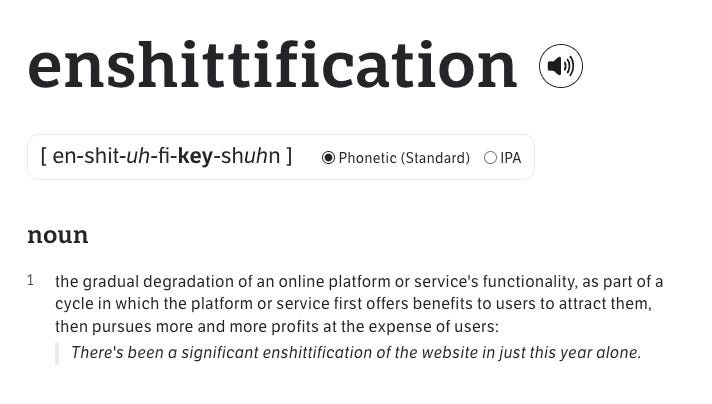The De-shittification Society, pt. 1: birth of a PE1 community
My friend and long-time local reporter Rick Rousos died a net de-shittifier. And that's becoming my #1 life goal. How about you? Want to fight enshittification? Let's hangout and discuss and act.
I’m proposing a regular, casual social gathering here in Polk County for anyone who wants to seek de-shittification in their lives, community, or country — at whatever scale is possible. I’m aiming for the evening of Thursday, February 6th to start (going out of town for a while before that.) If this interests you, email/comment so I can get a sense of the venue to choose — most likely a coffee shop or bar at first. Also, I know I have clusters of readers in the Sarasota, Tallahassee, and Gainesville areas at least. I’d love to arrange a meet-up if any of you are interested as well.
My dear departed friend Rick Rousos would have loved the word “enshittification.” He would have laughed that raspy, cig-powered, Detroit laugh; and it would have become a running inside joke for us — like “Give ‘em the heater, Ricky,” in the Lou Brown voice from Major League was for the nearly 25 years I knew him.
Rick died about the time of the election after struggling with dementia for a few years. We met in 1999 at The Ledger, where we worked together as reporters. I covered Polk County government; Rick sort of covered whatever interested him (or that interested our boss Skip Perez, the long-time Ledger executive editor.)
I actually met Rick before I met him. After Charles Canady (yeah that one) got an Olive Garden waitress fired for saying something to him about impeaching Bill Clinton way back in 1998, Rick got wind of it and did some excellent, fun reporting. The first thing I ever said to Rick was probably: love that story, man.
He had a skillset, personality, and vibe that matched perfectly the pre-Internet, institutional newspaper industry job description of “local reporter.” And he was a vital contributor to The Ledger’s community of creative, underpaid (but living), and vaguely and/or extremely off-kilter people occupying a productive, dignified, even strangely prestigious space in society.
When people lament the death of local newspapers as potent institutions, they tend to frame it in terms of journalism — the work output Rick Rousos and others created and the scrutiny they created on power. I actually think that’s a mixed bag. Like all institutions, local newspaper journalism always, in my view, did as to much to enable misbehaving or venal power as it did to check it. See Leo Schofield.
Rather, I lament far more the death of the creative, diverse, civic community that put The Ledger together each day. Skip, of whom I’ve had some criticisms over the years about journalism, was a truly marvelous, tolerant, and nurturing mayor of our little community of oddballs, who thrived in our way as “working class” creatives, community patriots, and sometime muckrakers.
Losing that to the whims of cold economic models is a small lived example of the “enshittification” of shared human living.
Reversing enshittification with new models is the challenge of our age
Full credit for coinage of “enshittification” goes to a tech writer named Cory Doctorow. This article he wrote, titled: “No one is the enshittifier of their own story” provides good context.
Doctorow’s usage focuses specifically deterioration of user/customer experience on digital tech platforms; but you’ll see that it has application to virtually every system built with human interaction and experience at its core.
This excerpt is very good on how power appeals to the sense of duty and purpose and decency of citizens and workers to become the face of enshittification and endure its personal consequences as they become trapped with nowhere to go. And “learn to code” isn’t the all-purpose slur against liberal arts people that it used to be.
The fourth and final constraint was labor. Tech bosses motivated their workers by appeals to a sense of mission, telling techies they were part of a great work of bringing forth a digital society that was more connected, faster, and better. This worked great – these workers missed family funerals and slept under their desks to ship code – but failed badly.
The problem is that when you appeal to a worker by inspiring a sense of duty and mission, you will have to contend with that sense of duty and mission when you ask them to enshittify the products they poured their lives into. And because tech workers were in such high demand, they could simply refuse to work on projects that made users worse off in order to make shareholders better off.
But in an environment of mass tech layoff and even bigger stock buybacks, tech workers have lost their bargaining power. Today, the answer to ‘‘I refuse to worsen this product due to the moral injury it would cause me’’ is ‘‘fine, don’t let the door hit you in the ass on the way out.’’
How many other professions, jobs, occupations, enthusiasms, marriages, relationships, memberships, etc does that part in bold apply to? All of them?
Let us de-shittify wherever we can
I think the antidote of enshittification is genuine community and attention to human experience. Humans are not redundant. We are not spreadsheet cells. We are not born cannon fodder or illegal. There is nothing so enormous on this Earth as the scope and epic experience of even the most mundane human consciousness.
Anything that anyone does to de-shittify that experience without pointlessly enshittifying somebody else’s is a victory worth celebrating. And I think it is crucially important to enjoy de-shittification if you’re going to do it well and at any scale at all before you die.
I enjoy it.
I want to be a net de-shittifier in life for everyone and everything I have any power to effect. As I get older and start to peek at mortality, that is increasingly my overriding personal goal. I think I am a happy person today because of that goal and my perception that I’ve more or less lived up to it so far. That is not to say I have not enshittified many situations and human experiences either through accident or failure or misjudgment or cowardice or laziness or even occasional gratuitous shittiness. But I care deeply and selfishly about where I fall on the net shittification scale. And I think I fall on the right side today. I hope all of you will keep me honest in that assessment if we manage to make this community a thing.
And yes, part of de-shittification is the active confrontation with enshittification. Stopping an enshittifier is often a more powerful blow for de-shittification than anything else. De-shittification is, by definition, a reaction to shittification entropy — the human tendency toward enshittification. Thus, de-shittification often requires the brutal application of moral force.
But de-shittification also requires the openness to any act of de-shittification a heretofore enshittifier offers us — and I’m not talking about empty fake civility designed to ease personal awkwardness. I’m talking about genuine effort at reconciliation, which requires far more courage than spite does.
Enshittification marches forward when it can use itself to play human beings against each other. No true de-shittifier, in my opinion, can really enjoy a grudge. Grievance is the fuel of enshittification. Many many people should think hard about that.
Again, the good news is that there are no small acts of de-shittification. Something as tiny as washing the dishes can be an act of de-shittification — an affirmative act that changes gross disorder into something better for a moment in a shared household.
In Part 2, I’ll share my own personal de-shittification priorities — for myself, my community, my country, and for humanity.
Rick Rousos de-shittified any situation
Few people’s memories make me smile as instinctively as Rick’s.
We bickered quite a bit, like brothers. But it never enshittified our shared experience. Even his temper, as I lived it, was somehow de-shittifying — both anchored in the right side of moral questions and just kind of fun. Rick in high dudgeon was glorious and infectious. His reporting, despite his pretend cynical bravado, always emerged from basic sympathy for decent people.
Rick was one of the strongest heartbeats of the lost community of that pre-collapse Ledger — whether in the newsroom or on bar stools at Molly’s. I’m glad to he got to live that life before enshittification took it from a new generation.
He was definitely a net de-shittifier, which is the greatest compliment I can pay anyone. And I think creating an in-the-flesh community force for de-shittification is a good way to honor him.






Ah yes, speaking of enshittification.
Count me in as a founding member of the Rousos Memorial Deshittification Society! (It sounded better in my head, but maybe a name from which to build.)